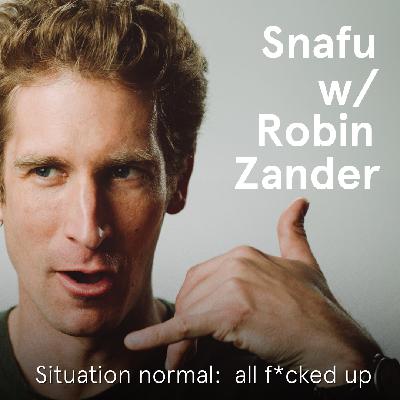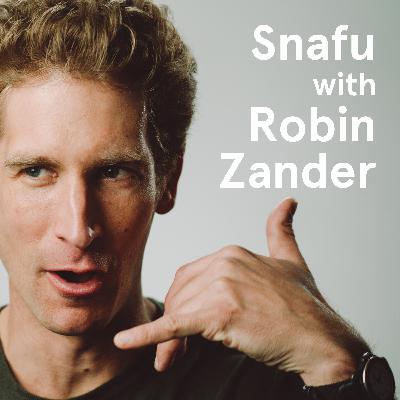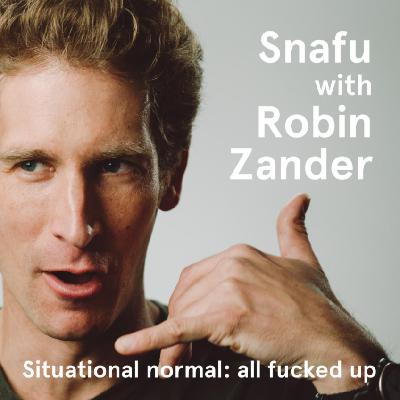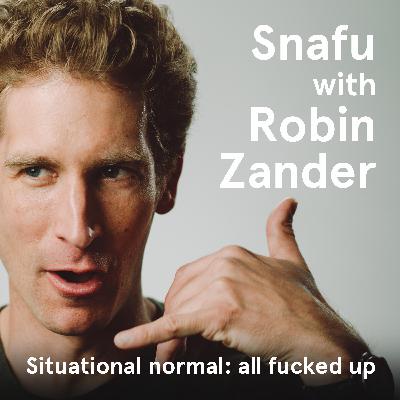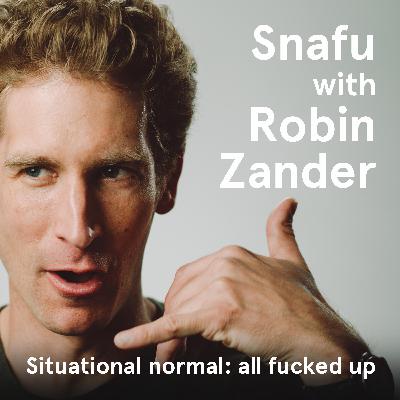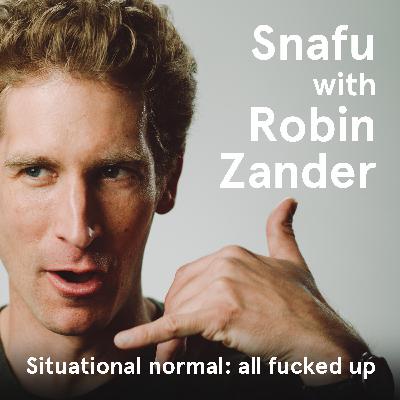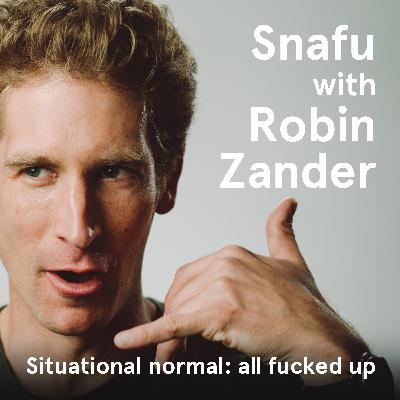How to Not Know with Simone Stolzoff
Description
Welcome back to Snafu w/ Robin Zander.
In this episode, I’m joined by Simone Stolzoff – author of The Good Enough Job and the upcoming How to Not Know – and our opening keynote speaker at Responsive Conference 2025.
We explore what it means to have an identity beyond your job title, why rest is essential for high performance, and how ritual and community offer grounding in an age of uncertainty. Simone shares how Judaism and Shabbat have shaped his views on balance, the role of “guardrails” over boundaries, and how we can build more durable lives – personally and professionally. We talk about the future of religion, the risks and opportunities of AI, and why books still matter even in a tech-saturated world. Simone also offers practical writing advice, previews his next book, and explains why embracing uncertainty may be the most valuable skill of all.
Simone will be speaking live at Responsive Conference 2025, September 17–18, and I can’t wait for you to hear more.
If you haven’t gotten your tickets yet, get them here.
Start (00:00 )
Identity Beyond Titles (01:07 .414)
-
What identities do you hold that aren't listed on your LinkedIn?
-
Simone’s Answer:
-
Ultimate frisbee player – “the entirety of my adult life”
-
Aspiring salsa dancer – taking intro classes with his wife
-
Former spoken word poet – “It was the most important thing to me when I was 19 years old.”
-
New father – navigating life with a five-month-old
-
"I encourage people to ask: what do you like to do, as opposed to what do you do?"
Shabbat as a Sanctuary in Time (01:58 .831)
-
Robin references Simone's TED Talk, focusing on Shabbat as a metaphor for boundary-setting and presence.
-
Simone expands:
-
Shabbat offers a weekly rhythm to separate work from rest.
-
Emphasizes the idea of "sacred time" and intentional disconnection from screens.
-
Shabbat is a “sanctuary in time,” paralleling physical sanctuaries like churches or synagogues.
-
Relates this to work-life balance, noting that intentions alone aren't enough – infrastructure is needed.
-
"We have intentions… but what actually leads to balance is structural barriers."
Boundaries vs. Guardrails (04:44 .32)
-
Cites Anne Helen Petersen’s metaphor:
-
Boundaries = painted lane lines
-
Guardrails = physical barriers that actually keep you on the road
-
There are calls for more guardrails (structural protections) in modern life.
-
Examples:
-
Airplane mode during playtime with his kid
-
Attending yoga or activities where work can’t creep in
-
"Individually imposed boundaries often break down when the pressures of capitalism creep in."
Religion, Ritual & Community (06:48 .57)
-
Robin asks how Judaism has shaped Simone’s thinking around work and life.
-
Simone reflects:
-
Religion offers a “container” with a different value system than capitalism.
-
As organized religion declined, people turned to work for identity, meaning, and community.
-
Religion can offer rituals to process uncertainty — e.g., mourning rituals like sitting shiva.
-
Religious or community spaces offer contrast: they don’t care about your career success.
-
"Religion is sort of like a container… with a value system that isn't just about growth charts."
-
"It can be refreshing to say: Day 1, do this. Day 7, go for a walk."
-
Personal journey:
-
Simone reconnected with Judaism in his 30s as he built his own family.
-
Once, went out of obligation, then rejected it, and now see beauty in ritual and intergenerational wisdom.
The Future of Religion & Community (09:12 .454)
-
Robin theorizes a future rise in spiritual and communal gatherings:
-
Predicts new spiritual movements or evolutions of old ones
-
Notes a hunger for meaningful in-person connection, especially post-AI and amid tech saturation
-
"There's a hunger... as AI and screens define how we relate, people want to gather in person."
-
"I don’t tend to make predictions, but I think this one’s inevitable."
-
Simone agrees... but offers data as contrast:
-
Cites the decline in religious affiliation in the U.S.
-
1950s: 3–4% unaffiliated
-
Today: Nearly 1 in 3 identify as “Nones” (no religion)
-
Notes reasons:
-
Rising wealth tends to increase secularism
-
The internet creates alternate identity spaces
-
"I do believe there is inevitability in the growth [of spirituality]... But the data points the opposite way."
-
Simone reflects on the factors behind declining religious affiliation:
-
Doubt now builds community – the internet has enabled people to connect around leaving religion as much as practicing it.
-
Political entanglement – many young Americans, especially, are alienated by the perceived overlap between right-wing politics and Christianity.
-
Yet despite this secular trend, the need for meaning, ritual, and purpose remains universal.
-
“There still is this fundamental need to find meaning, to find purpose, to find ritual… even if it’s not in the forms we’re used to.”
A Church in the Mission (13:07 .182)
-
Robin shares a formative experience from 2016:
-
That year, he launched both Robin’s Café and the first Responsive Conference.
-
When he walked into the theater space that would become his café, he encountered a young, diverse Christian revival group – live music, dancing, and energetic worship happening in a Mission District theater.
-
This juxtaposition – a traditional spiritual gathering inside a modern, “hip” venue – left a lasting impression.
-
“It felt like a revival meeting in the South… except it was full of people my age and younger, partying on a Saturday morning – and it just happened to be church.”
You Are More Than Your Work (14:51 .182)
-
Robin segues into the idea of multiple identities:
-
He recalls how reading The 4-Hour Work Week helped him embrace not defining himself solely by his entrepreneurial work.
-
Even on tough days running a business, movement and fitness have been a grounding force – something he does daily, independent of career performance.
-
Quotes from Simone’s TED Talk:
-
“Some people do what they love for work; others work so they can do what they love. Neither is more noble.”
-
Robin asks Simone to share the origin of this line and how it connects to the poet Anis Mojgani.
-
Simone recounts a pivotal conversation during college:
-
As a poetry and economics double major, he was wrestling with career path anxiety.
-
He interviewed his favorite poet, Anis Mojgani, asking: “Do you believe in the idea, ‘Do what you love and never work a day in your life’?”
-
Mojgani’s response:
-
“Some people do what they love for work. Others do what they have to so they can do what they love when they’re not working. Neither is more noble.”
-
This countered Simone’s expectations and left a deep impression. He highlights two cases for cultivating a broader identity beyond work:
-
Business Case:
- <l

